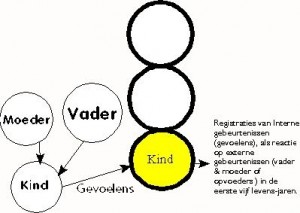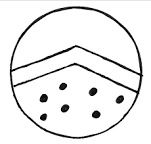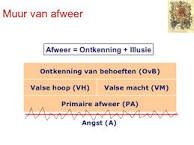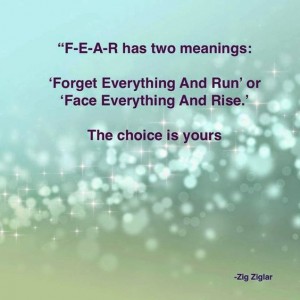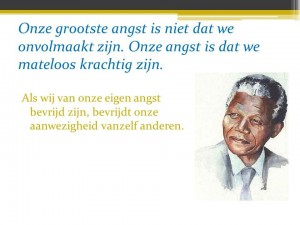Codependentie en het innerlijke kind
Ik leerde en zag dat je je Innerlijke kind op dezelfde manier behandelt zoals je ouders jou als kind hebben behandeld. In mijn geval was dat: geen aandacht ontvangen, geen liefde en koestering, ik kan me niet herinneren dat m’n ouders me ooit knuffelden, er was geen warmte. Ik werd opgevoed door dienstmeisjes, m’n ouders waren continu bezig in de slagerij en waren workaholics(en dat werd ik dus later ook! De appel valt niet ver van de boom).
Ik wist, door m’n opvoeding, niet eens van het bestaan van een Innerlijk kind, laat staan dat ik het aandacht gaf en liefhad. Charles Whitfield schrijft in z’n boek ‘Healing the child within’, dat als je je innerlijke kind niet koestert en geen aadacht geeft er een vals, onecht zelf ontstaat en dan heb je de codependentie te pakken.
Ik zat in de ontkenning dat ik uit een disfunctiuoneel gezin kwam, net als een vrouw die ik ontmoette die niet getuigde van liefdevolle aandacht voor haar innerlijke kind dus informeerde ik naar haar opvoeding hoe dat was. Ze antwoordde dat ze heel liefdevolle ouders had gehad en ik geloofde haar niet en vroeg dus door. Ik vroeg: ‘Hoe was je vader dan voor je?’ ‘O, die was er nooit’ zei ze doodleuk. Ik zei: ‘Dan ben je vreselijke in de steek gelaten en nu laat je ook je innerlijke kind in de steek!’. Het deed me goed van haar te horen dat ze nu een cursus volgt over het innerlijke kind om daar beter mee om te gaan en dat ze daar veel plezier aan beleeft.
In een disfunctioneel gezin werd je gezegd dat je niet goed genoeg bent, dat je je moet schamen, je niet zo moet zijn als je bent, etc. Je ontvangt voorwaardelijke liefde die helemaal geen liefde is en zo leert het kind codependent gedrag, namelijk dat je je moet aanpassen aan de ander en wegcijferen om ‘geliefd’ te worden, dat je de liefde van buiten mnoet krijgen. Diep van binnen voel je je de liefde niet waard omdat je ouders niet onvoorwaardelijk van je houden om wie je bent en je gaat ervan uit dat het niet aan je ouders kan liggen, maar dat het jouw fout is. Je internaliseert e.e.a. en dan ontstaat de innerlijke criticus die zegt dat je niet oké bent, niet goed genoeg. Er is veel verdrongen woede in het kind omdat het niet de liefde, warmte, waardering, erkenning en aandacht krijgt waar het behoefte aan heeft, en die woede is verdrongen omdat je ouders woede verbieden tenminste dat denk je
Ik schrijf op het moment het boek ‘woedemotivatrie & codepenentie over dit interessante onderwerp. In het disfunctiuonele gezin mag je je sowieso niet vrijelijk uiten. Niet praten, niet voelen, niet vragen is de regel. Tegenstrijdige regels opvolgen is het credo en dat is heel verwarrend en vervreemdend voor het kind dat niet leert te vertrouwen op z’n eigen waarneming en dan wordt het kind onecht ontwikkelt het een vals zelf, Whitfield heeft gelijk.
Nu is het van groot belang dat we zelf een liefhebbende ouder en volwassene voor ons innerlijke kind worden. Het innerlijke kind zal zich niet meteen openbaren het is kopschuw en achterdochtig geworden na zoveel traumatische ervaringen met ouders, volwassen en met jou
De dialoog met je innerlijke kind blijven aangaan, net zolang tot er contact komt en dan tot integratie komen om het kind mee te laten doen en ruimte te geven. Stel ook vragen wat het wil, waar het bang voor is, etc. Je zult als mens vrolijker, speelser, spontaner, authentieker en wijzer worden als het innerlijke kind meedoet en volledig en onvoorwaardelijk geaccepteerrd wordt. De Bijbel zegt het ook:’ Word als de kinderen en je zult het koninkrijk God’s binnengaan’…
Je innerlijke ouder kan je innerlijke kind geven waar het behoefte aan heeft en nooit gekregen heeft, dat is de weg naar heel worden. In de Transactionele Analyse kennen we ook de rollen Ouder-Volwassene-Kind en bij veel mensen is het kind afgescheiden van de ouder en volwassene, dat kenmerkt zich door overdreven serieusheid en zwaarmoedigheid en ernstig gedrag. Voltaire zei: ‘Ik beschouw ernst als een ziekte’. Osho wees er ook al op dat je feest mag vieren en speels mag zijn en daar heb je je innerlijke kind bij nodig. Wordt niet kinderachtig maar kinderlijk en speels, het kind kent de lerende capaciteit, stelt veel vragen, heeft interesse, is creatief, heeft energie, is echt, vergevingsgezind, etc., etc.. Dat zijn toch mooie kwaliteiten die zeer de moeite waard zijn en het leven tot Leven maken.
Voeg niet alleen jaren toe aan je leven maar Leven aan je jaren is een uitspraak die ik ooit las. Ik zat vele jaren in een beschermende een afwerende houding en verdedigde uit en dan kun je niets over jezelf leren, geen zelfkennis opdoen, terwijl ik mezelf wijsmaakte dat ik mezelf kende(-)
Het kind weet dat het nog niet weet net als de wijze Socrates die zei: ‘Nu weet ik dat ik niets weet’. en dat is en vruchtbare houding om tot wijsheid te komen, want dan ga je onderzoeken en leer je veel. Het is zelfs zo dat als je geen open en lerende houding hebt je per definitie in een afschermende en beschermende houding zit en alles vastzet en rigide bent.
Pas na m’n crisis in 1992 merkte ik dat er veel mis met me was en ging ik aan de slag met mezelf ik deed hetzelfde als Melody Beattie die ook niet begrepen werd door haar therapeuten, ook zij werd haar eigen therapeut en expert op het gebied van codependentie.
Bron: Book "Integrating Your inner child appears autumn,nl 2018

